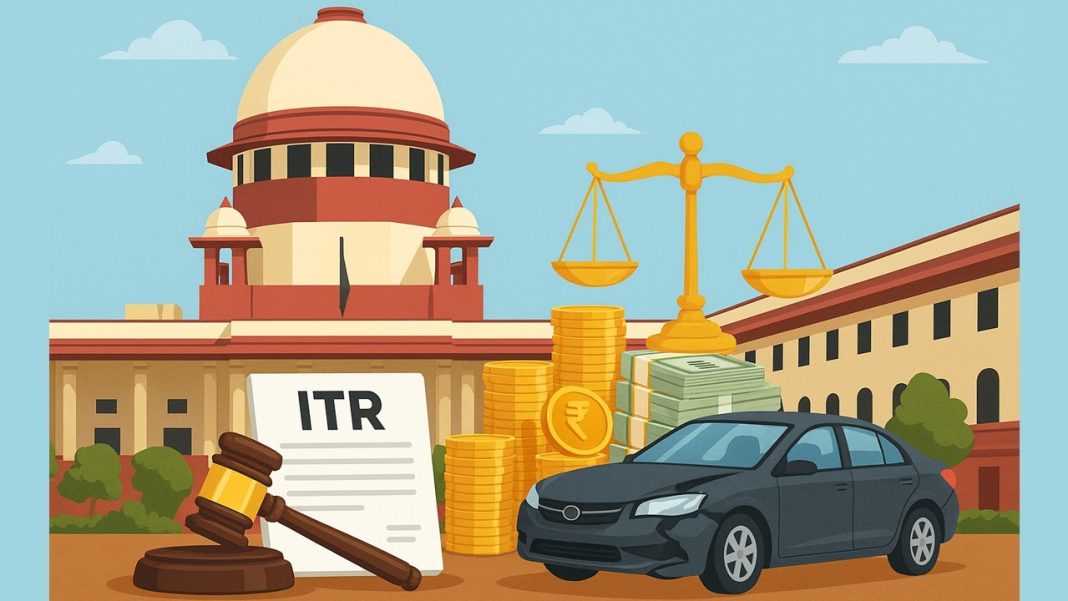Big Relief: Supreme Court Validates ITR, Enhances Motor Accident Claim to Rs 48.44 Lakh
Recently, the Supreme Court took a major decision regarding motor accident compensation, saying that an Income Tax Return (ITR) filed by an individual before an accident cannot be simply ignored as fake. The benches comprised Justices K. Vinod Chandran and N. V. Anjaria. The Supreme Court in the present case increased the compensation amount from Rs. 23.09 lakhs (given by the High Court) to Rs. 48.44 lakhs for a man who lost his leg in an accident. The Court also stressed the difference between medical disability and how the injury actually affects a person’s ability to work and earn.
The present writ petition has been filed by Anoop Maheshwari (petitioner), the person who got injured, seeking a higher compensation than what was given by the Motor Accidents Claims Tribunal and the High Court for the injuries he suffered in a motor accident.
Background of Case
The case began when a person suffered a motor accident on April 9, 2007. In the accident, the person named Anoop Maheshwari was driving a motorcycle, which was carelessly struck by a truck. In the accident, the claimant suffered severe injuries and lost one leg. His condition was described as a ‘hemipelvectomy’ in the medical certificate, which involved the loss of a leg along with part of the pelvic bone being removed. The tribunal had already ruled that the accident was due to the negligence of the truck driver, a decision that was final because the High Court rejected the insurance company’s appeal.
The key issue raised in the Supreme Court was about how much compensation should be given to the appellant for his injury. The Tribunal had wrongly assessed the claimant’s disability at 45%, misunderstanding the Employees’ Compensation Act, 1923. It also refused to accept his ITR, claiming his business was just a trick to avoid paying taxes because his parents owned a big business. As a result, the Tribunal gave him a total compensation amounting to Rs. 13,23,831.
High Court’s Decision
When the appeal was filed in the High Court, the court partially ruled in favour of the claimant. It increased his disability from 45% to 50% and the monthly income to Rs. 8000. The High Court awarded the claimed total compensation of Rs. 23,09,600.
Supreme Court’s Decision
When the appeal was filed in the apex court, i.e., the Supreme Court, it analysed all the facts of the case and supported the HC’s ruling of 50% functional disability. It said that for deciding compensation in motor accident cases, the important thing is not just the medical disability but how much the injury affects the person’s ability to earn a living. In this case, even though the claimant lost a limb, he could still run his business with the help of a prosthetic leg. Therefore, the Court determined that 50% represented a fair measure of the impact on his earning capacity.
The Court also agreed with the High Court that the Motor Accident Claims Tribunal was wrong to dismiss the claimant’s income tax returns without solid reasons. The Court noted that the claimant had registered his business in March 2006 and filed tax returns for 2005-2006 and 2006-2007, all before the accident happened in April 2007. So, it was not possible that he had faked the documents in anticipation of the accident. Therefore, the Court accepted his declared gross income of Rs. 196,000 for the year 2007-2008 and calculated his net income (after tax) as Rs. 191,000.
However, the Supreme Court disagreed with the High Court’s decision to add 40% to the claimant’s income for future prospects (expected growth in income). The court said this increase wasn’t appropriate, especially since the claimant was assessed to have 50% disability and could still run his business. So, the 40% addition for future income growth was removed.



